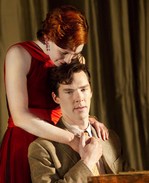SITE GUIDE
SEARCH
REVIEWS
REVIEW ARCHIVES
ADVERTISING AT CURTAINUP
FEATURES
NEWS
Etcetera and
Short Term Listings
LISTINGS
Broadway
Off-Broadway
NYC Restaurants
BOOKS and CDs
OTHER PLACES
Berkshires
London
California
New Jersey
DC
Connecticut
Philadelphia
Elsewhere
QUOTES
TKTS
PLAYWRIGHTS' ALBUMS
LETTERS TO EDITOR
FILM
LINKS
MISCELLANEOUS
Free Updates
Masthead
Writing for Us
A CurtainUp  London Review
London Review
 London Review
London ReviewAfter the Dance
|
You are a seriously minded little thing — Joan to Peter
|

Nancy Carroll as Joan and Benedict Cumberbatch as David (Photo: Johan Persson) |
The party generation is still in full swing and in the Scott-Fowler household an ever present drinks trolley provides unlimited alcohol for these drinking classes for whom the beautiful things of the 1920s now growing older. Thea Sharrock directs in Hildegarde Bechtler's beautiful, substantial and airy living room set, a large mansion apartment with a wide balcony overlooking the grounds, elegantly lit by Mark Henderson, the sunlight catching the silver cigarette box on the desk.
Joan Scott-Fowler (Nancy Carroll) and David (Benedict Cumberbatch), who has an independent income, have been married for twelve years. David is writing a weak historical biography about King Ferdinand II, "Bomba" of Naples, and he is paying his younger and impoverished cousin Peter (John Hefferman) to act as his secretary. Peter's flirtatious and determined fiancéHelen (Faye Castelow) brings her newly qualified doctor brother George (Giles Cooper) to the flat and wants David to agree to be examined by him. Prissy and pretty, Helen thinks that David is ill with liver disease although he doesn't look very yellow to us. David very reluctantly agrees to see the doctor and actually does give up drink. John Reid (Adrian Scarborough) is another hanger on in the Scott-Fowler household but one who is witty. Joan tells us that she drinks because she is afraid that David might find her boring. There is a tragedy at the end of Act Two which changes everybody's life, a harbinger of the changes the war will make.
The performances are uniformly sound. This is the first role I have seen from Benedict Cumberbatch where I have thought him really grown up, no longer a boy but a man. Nancy Carroll is excellent as his feigned sophisticate wife, pretending not to care about her husband, instead drinking far too much herself to ensure that she is not "boring". There is a tender scene between them at the piano when David plays the 1920s foxtrot love song Avalon but on the whole there is too little connection in this marriage.
We all hated Faye Castelow's Helen, an interfering and controlling young woman who has no qualms about abandoning her fiancéPeter in order to fall in love with someone else's husband. It is here that I start to have doubts about the authenticity of Rattigan's characterisation as there seems to be no sexual passion between David and the younger woman and it is hard to believe why he would have been attracted to her. In fact when she announces that they will be leaving London to live in a country cottage, we can see him visibly shrink from the idea as it dawns on him just what his future might consist of. There is an amusing cameo from Jenny Galloway as the knitting Miss Pike, Peter's secretarial replacement in Act Three.
Adrian Scarborough is tremendously good value as ever, here as John Reid the fool who is wiser than the rest of the cast. He sees Helen for what she is "a romantic little girl's imagination" and tries loyally to support Joan in a heart rending scene. At the end of the play John Reid leaves for the offer of a mundane job in Manchester working for a friend's window cleaning company where there is not much prospect of anyone appreciating his wit. I liked too John Hefferman's secretary although when he returns in Act Three, destitute, it seems overstated.
There has been much attention to period detail on costume. There is a wild party scene fabulously dressed with much posing and talk about drugs and parties. An explicit sex scene and a passing nude party goer seem out of place in a Rattigan play. Despite the parties, there is an overwhelming feeling of emptiness here for this generation trapped between two world wars.
|
Subscribe to our FREE email updates with a note from editor Elyse Sommer about additions to the website -- with main page hot links to the latest features posted at our numerous locations. To subscribe,
E-mail: esommer@curtainup.comesommer@curtainup.com
put SUBSCRIBE CURTAINUP EMAIL UPDATE in the subject line and your full name and email address in the body of the message -- if you can spare a minute, tell us how you came to CurtainUp and from what part of the country. |
| After the Dance
Written by Terence Rattigan Directed by Thea Sharrock Starring: Benedict Cumberbatch, Nancy Carroll, Adrian Scarborough With: John Hefferman, Nicholas Lumley, Faye Castelow, Giles Cooper, Pandora Colin, Lachlan Nieboer, Juliet Howland, Giles Taylor, Richard Teverson, Jenny Galloway, Daniel Gosling, Leo Staar, Hannah Stokeley, Natalie Thomas, Charlotte Thornton Design: Hildegarde Bechtler Lighting: Mark Henderson Sound: Ian Dickinson Music: Adrian Johnston Choreographer: Fin Walker Running time: Three hours with two intervals Box Office: 020 7452 3000 Booking until 11th August 2010 Reviewed by Lizzie Loveridge based on 10th June 2010 performance at the Lyttelton, National Theatre, South Bank, London SE1 9PX (Rail/Tube: Waterloo) |
|
REVIEW FEEDBACK Highlight one of the responses below and click "copy" or"CTRL+C"
Paste the highlighted text into the subject line (CTRL+ V): Feel free to add detailed comments in the body of the email . . . also the names and emails of any friends to whom you'd like us to forward a copy of this review. |
|
London Theatre Tickets Lion King Tickets Billy Elliot Tickets Mighty Boosh Tickets Mamma Mia Tickets We Will Rock You Tickets Theatre Tickets |




